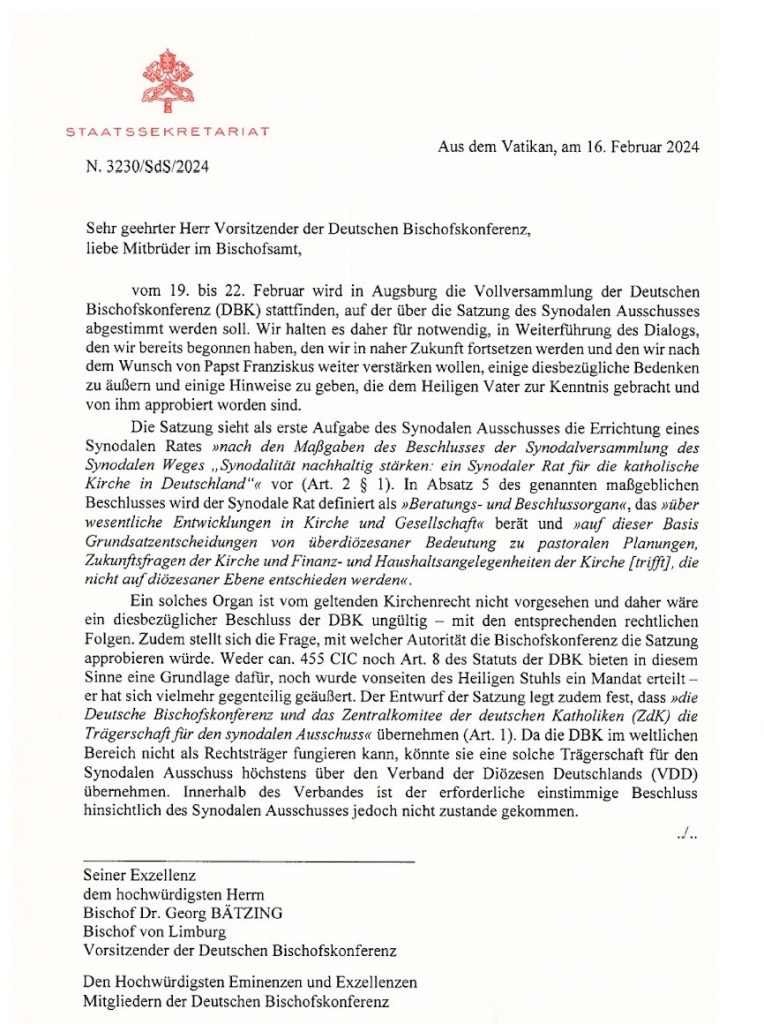(ZENIT News / Rome, 20.02.2024).- Through a letter signed, on behalf of the Pope, by three Cardinals of three different entities of the Roman Curia (Parolin of the Secretariat of State; Férnandez of the Doctrine for the Faith; and Prevost of the Dicastery for Bishops), a schism has been averted, which would have proceeded with the establishment of a Synodal Council. This Council, forbidden by the Pope in 2023, had the mission to be a consultative and decision-making body able to take decisions above the diocese and, hence, supplanting the personal authority of each Bishop in the territory entrusted to him. For the time being, the German Bishops have desisted from implementing this reality.
Here is an English translation of the letter sent to the President of the German Bishops last February 16.
* * *
Dear President of the German Episcopal Conference,
Dear Brother Bishops,
The General Assembly of the German Episcopal Conference (DBK) will be held in Augsburg from February 19-22, in which the Statutes will be voted on of the Synodal Council. Hence, we regard as necessary — in continuation with the dialogue we have already initiated, which we will continue in the near future, and which we wish to reinforce even more, in keeping with Pope Francis’ desire –, to express some concerns in this respect and provide some directions, which have been made known to the Holy Father and approved by him.
The Statutes state that the first task of the Synodal Commission is the establishment of a Synodal Council “in keeping with the dispositions of the resolution of the Synodal Path’s Synodal Assembly, to strengthen synodality in a sustainable way: a Synodal Council for the Catholic Church in Germany” (Art. 2 § 1). Paragraph 5 of the mentioned authorized resolution defines the Synodal Council as a “consultative and decision-making body,” which advises “on significant events in the Church and in society” and, on this basis, “takes essential decisions of supra-diocesan importance on pastoral planning, future questions of the Church and financial and budgetary affairs of the Church, which are not decided at the diocesan level.”

This body is not provided for in current Canon Law and, therefore, a decision of the DBK in this sense would be invalid with the corresponding legal consequences. Posed also is the question of what authority the Episcopal Conference would have to approve the Statutes. Neither can. 455 CIC nor art. 8 of the of the Statute of the DBK provide a basis for it, nor has the Holy See issued a mandate; on the contrary, it has expressed itself in the opposite sense. The project of Statutes also stipulates that the German Episcopal Conference and the Central Committee of German Catholics (ZdK) will assume the responsibility of the “Synodal Committee” (art. 1). Given that the DBK cannot act as a legal entity in the secular realm, the most it could do is to assume the said sponsorship for the Synodal Committee through the Association of German Dioceses (VDD). However, the necessary unanimous decision has not been reached, at the heart of the VDD, in regard to the Synodal Committee.
It must be remembered that the question was already outlined during the last ad Limina visit and, subsequently, in the letter of the Cardinal Secretary of State and of the Prefects of the Dicasteries for the Doctrine of the Faith and for Bishops of January 16, 2023, in which it was expressly requested, by special mandate of the Holy Father, not to proceed with the creation of the said Council.
Therefore, the approval of the Statutes of the Synodal Committee would be contrary to the instruction of the Holy See, issued by special mandate of the Holy Father, and would present him, once again, with a fait accompli.
In this connection, it was agreed jointly last October that the ecclesiological questions addressed by the Synodal Path , including the subject of an inter-diocesan consultative and decision-making body, would be treated at greater depth in the next meeting between representatives of the Roman Curia and the DBK. Should the Statute of the Synodal Committee be approved before this meeting, the question arises of the purpose of this meeting and, more generally, of the ongoing dialogue process.
We would like you to take into account the observations formulated here and we trust that they will be taken into account in the debate of the next plenary meeting of the DBK.
United in prayer, we greet you fraternally.
Thank you for reading our content. If you would like to receive ZENIT’s daily e-mail news, you can subscribe for free through this link.



